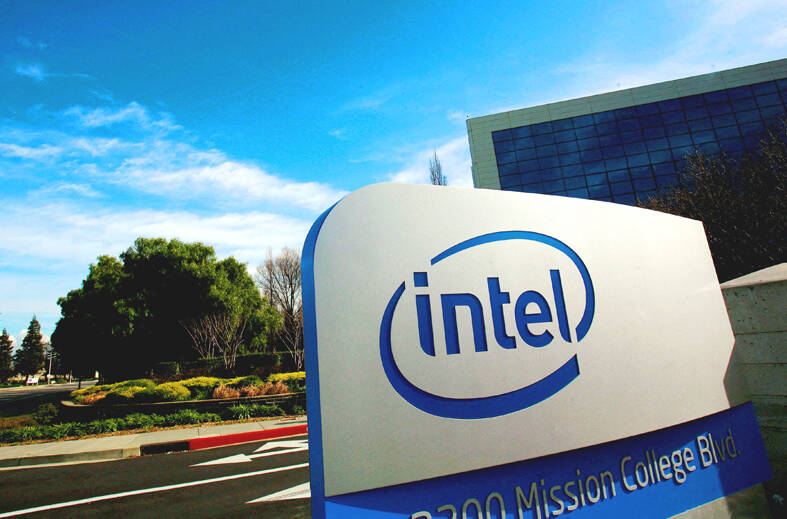Intel Corp shares on Thursday gained on a report that the company has tentatively agreed to a joint venture with Taiwan Semiconductor Manufacturing Co (TSMC, 台積電), a sign the beleaguered US chipmaker is moving ahead with a plan that has been highly anticipated by investors.
TSMC, the world’s largest contract chipmaker, is to take a 20 percent stake in the new company, the report said.
The shares on Thursday climbed more than 2 percent after the Information Web site reported the news, erasing a decline of more than 5 percent earlier in the session. The shares had been up about 10 percent this year through Wednesday, fueled in part by hopes that Intel would pursue such a move.

Photo: Reuters
Executives from both companies reached a preliminary agreement to form a joint venture that would run Intel’s manufacturing plants, the Information reported.
Intel and other US chipmakers would hold the majority of shares in the initiative, which would include at least some of the US company’s factories, said the news site, which cited unnamed people familiar with the situation.
TSMC yesterday said it has “no comment on market rumors” when responding to an inquiry about the matter from the Taipei Times.
Premier Cho Jung-tai (卓榮泰) yesterday downplayed the potential combination between TSMC and Intel when he was asked about whether the TSMC-Intel deal would be one of the nation’s bargaining chips in its negotiations to reduce the 32 percent “reciprocal” tariff imposed on Taiwanese imports to the US.
“The principle is that for any ongoing cooperation or negotiations, we will put the country’s interest first,” Cho said. “As for new speculation or news, we have not received any reports yet.”
United Microelectronics Co (UMC, 聯電), Taiwan’s second-largest contract chipmaker, was reportedly in merger talks with US chipmaker GlobalFoundries Inc in another push by Washington to secure more less-advanced chip capacity in the US.
UMC denied the report.
Bloomberg News in February reported that TSMC and Intel were discussing the idea at the request of the administration of US President Donald Trump. The scenario is meant to help address Intel’s deteriorating financial state, which has forced the company to cut thousands of jobs and curb its expansion plans.
If the plan goes ahead, it would be a dramatic early step for Intel chief executive officer Lip-Bu Tan (陳立武), who took the job last month.
During an appearance at the Intel Vision conference in Las Vegas on Monday, he said the chipmaker would spin off assets that are not central to its mission.
TSMC has already been stepping up its investments in the US. TSMC chief executive officer C.C. Wei (魏哲家) joined Trump at an event last month and pledged to spend an additional US$100 billion on chipmaking plants in the US.
Additional reporting by Lisa Wang

NEW IDENTITY: Known for its software, India has expanded into hardware, with its semiconductor industry growing from US$38bn in 2023 to US$45bn to US$50bn India on Saturday inaugurated its first semiconductor assembly and test facility, a milestone in the government’s push to reduce dependence on foreign chipmakers and stake a claim in a sector dominated by China. Indian Prime Minister Narendra Modi opened US firm Micron Technology Inc’s semiconductor assembly, test and packaging unit in his home state of Gujarat, hailing the “dawn of a new era” for India’s technology ambitions. “When young Indians look back in the future, they will see this decade as the turning point in our tech future,” Modi told the event, which was broadcast on his YouTube channel. The plant would convert

‘SEISMIC SHIFT’: The researcher forecast there would be about 1.1 billion mobile shipments this year, down from 1.26 billion the prior year and erasing years of gains The global smartphone market is expected to contract 12.9 percent this year due to the unprecedented memorychip shortage, marking “a crisis like no other,” researcher International Data Corp (IDC) said. The new forecast, a dramatic revision down from earlier estimates, gives the latest accounting of the ongoing memory crunch that is affecting every corner of the electronics industry. The demand for advanced memory to power artificial intelligence (AI) tasks has drained global supply until well into next year and jeopardizes the business model of many smartphone makers. IDC forecast about 1.1 billion mobile shipments this year, down from 1.26 billion the prior

People stand in a Pokemon store in Tokyo on Thursday. One of the world highest-grossing franchises is celebrated its 30th anniversary yesterday.

Zimbabwe’s ban on raw lithium exports is forcing Chinese miners to rethink their strategy, speeding up plans to process the metal locally instead of shipping it to China’s vast rechargeable battery industry. The country is Africa’s largest lithium producer and has one of the world’s largest reserves, according to the US Geological Survey (USGS). Zimbabwe already banned the export of lithium ore in 2022 and last year announced it would halt exports of lithium concentrates from January next year. However, on Wednesday it imposed the ban with immediate effect, leaving unclear what the lithium mining sector would do in the